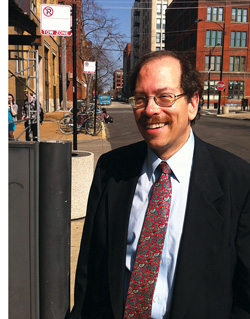Brookings Economist to Head UIC Urban Policy Research Center

Howard Wial is head of the Center for Urban Economic Development.
A former Brookings Institution economist has been named director of a public policy research center at the University of Illinois at Chicago.
Howard Wial heads the Center for Urban Economic Development, part of the UIC College of Urban Planning and Public Affairs. The center is known for its national research on issues affecting low-wage workers, including the day-labor market, wage theft, and compensation and labor practices in big-box stores.
As a Brookings fellow, Wial conducted public policy research on urban and regional economies.
He defined the UIC center’s mission as “understanding how urban and regional economies can become both more productive and more equitable.”
“Howard Wial brings a wealth of wisdom, insight and practical skills in the development potential of our nation’s metropolitan regions,” says Michael Pagano, dean of the College of Urban Planning and Public Affairs. “UIC and Chicago will benefit from his leadership of a research center with a longstanding tradition of partnering with organizations dedicated to making urban economies work.”
Before joining the Brookings Institution in 2005, Wial did public policy research for the Keystone Research Center in Harrisburg, Pa.; and the Working for America Institute, the U.S. General Accounting Office, the Office of Technology Assessment, and the U.S. Department of Labor; all in Washington. His research topics included employment, pensions, immigration and economic development.
Wial has taught law and economics at Rutgers University School of Law; labor studies and industrial relations at Pennsylvania State University; and micro- and macro-economics at Brown University, Carleton College, Brandeis University and Swarthmore College.
He co-edited a four-volume work, “Urban and Regional Policy and Its Effects (Brookings Institution Press, 2008-2012), and “New Rules for a New Economy” (Cornell University/ILR Press, 1998). He has been a regular blogger for “The Avenue” at The New Republic.
Wial holds a law degree from Yale Law School and a doctorate in economics from the Massachusetts Institute of Technology. He earned his bachelor’s degree in economics from the University of Michigan.
